Good morning!
Greetings in the name of Father, Son, and Holy Spirit.
Praying for you, your family, your community, and the rest of the world. Right now, the whole world is suffering because of the Coronavirus (COVID-19). Let’s pray together to God, Our Ever-Loving Father, His mercy and protection on all, and God’s healing on those who are infected by the COVID-19. We all believe God’s grace and love rest on all who look upon Him every moment with faith in Him.
Hear my prayer, Lord;
let my cry for help come to you.
Do not hide your face from me
when I am in distress.
Turn your ear to me;
when I call, answer me quickly. (Psalm 102:1-2)
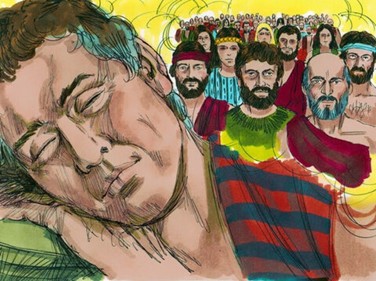
Jacob cheated his father and his older brother and stole the blessings set aside for the firstborn — Esau. Isaac, his father, thought that he was giving all blessings prepared for his firstborn, Esau. Isaac ate his favorite food and enjoyed Esau’s scent coming from Esau’s favorite clothes covering Jacob. Isaac gladly gave out all blessings fully and completely.
Soon Isaac and Esau realized what Jacob did to them. Esau was so mad at Jacob that Esau decided to kill Jacob. Jacob had no choice but fled for his life. His mother, Rebekah, suggested going to his uncle Laban’s house in Harran, 700 Km (i.e., 430 miles) away, and Jacob headed for his uncle’s house. At sunset, he searched for a place to sleep in the middle of the wilderness. Then, he laid his head on a rock. Jacob used to sleep in his comfortable bed back home. He closed his eyes and begged for sleep, but he could not sleep. What he had done to his father and brother haunted him. But he alone had to take all the guilts by himself. He was lonely, but nobody was there to comfort him.
Jacob finally fell asleep alone in the middle of the wilderness under the night sky. Animals howling at night made Jacob fearful, and his guilts heavily pressed down. He was always clever and cunning, and he could get all that we wanted and was satisfied. But, for this time, it was different. He got what he wanted since he was born, but the consequence was not what he expected. He was in the wilderness. Jacob, although he was cunning and smart, did not know what would come next. In the middle of the wilderness, Jacob finally realized that what his greed brought to him. He hit rock bottom. Jacob was completely helpless.
However, Jacob did not know the most important truth — God was always with Jacob. When Jacob tricked his brother Esau into making Esau sell his birthright as the firstborn with one bowl of lentil stew, God was there with Jacob. When Jacob deceived Isaac and stole the blessings set aside for the firstborn by Isaac, God was there with Jacob. When Jacob fled for his own life to the wilderness, God was there with Jacob. When Jacob could not sleep under the night sky in the middle of the wilderness, laying his head on a rock, God was there with Jacob. Finally, when Jacob helplessly fell asleep, God was there with Jacob. Then why was God there with Jacob? God loved Jacob.
God, who loved Jacob, came into Jacob’s dream as he was lonely sleeping in the middle of the wilderness, and God revealed Himself. Jacob woke up and realized that God was there with him. Jacob said, “Surely the LORD is in this place, and I wasn’t even aware of it!” But he was also afraid and said in awe, “What an awesome place this is! It is none other than the house of God, the very gateway to heaven!” So Jacob met God and was in fear and awe. It was the true and first encounter with God for Jacob.
Additionally, God, merciful and gracious, revealed His covenant to Jacob, which was given to his grandfather, Abraham, and his father, Isaac. Jacob thought that he got what he wanted, but God gave Jacob what God had prepared for him — His solemn covenant for generations to come and all the families of the earth who would be blessed through Jacob and his descendants.
Understand, then, that those who have faith are children of Abraham. Scripture foresaw that God would justify the Gentiles by faith, and announced the gospel in advance to Abraham: “All nations will be blessed through you.” So those who rely on faith are blessed along with Abraham, the man of faith. (Galatians 3:7-9)
Indeed, our savior, Jesus Christ, came as the descendant of Abraham, Isaac, and Jacob. Anyone who believes in Jesus Christ is the descendants of Abraham, Isaac, and Jacob. Therefore, we, the believers, are the descendants of Abraham, Isaac, and Jacob in faith.
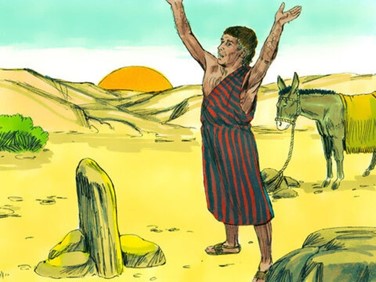
Jacob was so much encouraged by God, and comforted by God’s love. The next morning, Jacob got up very early. He took the stone he had rested his head against, and he set it upright as a memorial pillar. Then he poured olive oil over it. He named that place Bethel (which means “house of God”).
Then Jacob prayed to God: “If God will indeed be with me and protect me on this journey, and if he will provide me with food and clothing, and if I return safely to my father’s home, then God will certainly be my God. And this memorial pillar I have set up will become a place for worshiping God, and I will present to God a tenth of everything he gives me.”
Jacob’s first prayer was authentic but worldly and selfish. It was transactional, eye to eye or tooth to tooth. Jacob did not know who God was and what was God’s love. God came to Jacob neither because Jacob was upright before God nor because Jacob loved God. On the other hand, Jacob was indeed a terrible son and a disastrous brother, but God came to Jacob. At that time, Jacob could not understand God’s love, mercy, and grace because Jacob was still worldly. But God had just started His transformational work on Jacob. Jacob was spiritually a baby who needed to grow up.
Being encouraged by God, Jacob hurried on, finally arriving in the land of Harran, where his uncle lived. God, who was always with Jacob, prepared the way for Jacob. But, of course, Jacob did not know this fact, and he acted as he always did. Jacob was a clever person, and Jacob quickly scanned the area. He saw a big stone covering the well and shepherds standing near the well.
Then Jacob asked about Laban, and the shepherds answered they know Laban. The shepherds were waiting for the last group of sheep shepherded by Rachel, Laban’s daughter because they did not water the animals until all the flocks arrived. As soon as Rachel came to the well, Jacob went over to the well, moved the stone from its mouth, and watered his uncle’s flock. Jacob did it to get Rachel’s favor. Rachel was impressed by Jacob, as expected. Jacob saw her face filled with a big approval of Jacob.
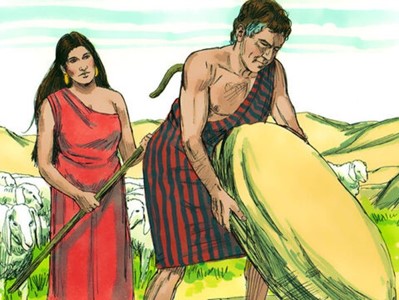
Jacob quickly approached Rachel and kissed Rachel. Then Jacob wept aloud. Jacob explained to Rachel that he was her cousin on her father’s side—the son of her aunt Rebekah. So Rachel quickly ran and told her father, Laban.
As soon as Laban heard that his nephew Jacob had arrived, he ran out to meet him. He embraced and kissed him and brought him home. When Jacob had told him his story, Laban exclaimed, “You really are my own flesh and blood!”
God prepared all these things ahead of Jacob, and Laban gladly accepted Jacob, who traveled 700 Km (or 430 miles) to see him.
After Jacob had stayed with Laban for about a month, Laban said to him, “You shouldn’t work for me without pay just because we are relatives. Tell me how much your wages should be.”
Now Laban had two daughters. The older daughter was named Leah, and the younger one was Rachel. There was no sparkle in Leah’s eyes, but Rachel had a beautiful figure and a lovely face. All of these were what God prepared for Jacob, and Jacob loved Rachel.

Jacob told her father, “I’ll work for you for seven years if you’ll give me Rachel, your younger daughter, as my wife.”
Agreed!” Laban replied. “I’d rather give her to you than to anyone else. Stay and work with me.” So Jacob worked seven years to pay for Rachel. But his love for her was so strong that it seemed to him but a few days.
Finally, the time came for him to marry her. “I have fulfilled my agreement,” Jacob said to Laban. “Now give me my wife so I can sleep with her.”
So Laban invited everyone in the neighborhood and prepared a wedding feast. But that night, when it was dark, Laban took Leah to Jacob, and he slept with her. Laban also gave Leah a servant, Zilpah, to be her maid. Jacob believed Laban, but Laban was as cunning as Jacob. In fact, for the first time in Jacob’s life, Jacob met a person who tricked Jacob. Jacob happily spent the first night with his wife, who was, he thought, Rachel.
When Jacob woke up in the morning—it was Leah! “What have you done to me?” Jacob raged at Laban. “I worked seven years for Rachel! Why have you tricked me?”
“It’s not our custom here to marry off a younger daughter ahead of the firstborn,” Laban replied. “But wait until the bridal week is over; then we’ll give you Rachel, too—provided you promise to work another seven years for me.”

Jacob experienced his defeat for the first time in his life. Jacob realized that he had no option but to work for Rachel to get her as his wife from Laban. So Jacob agreed to work seven more years. A week after Jacob had married Leah, Laban gave him Rachel, too. Laban also gave Rachel a servant, Bilhah, to be her maid. So Jacob slept with Rachel, too, and he loved her much more than Leah. He then stayed and worked for Laban for the additional seven years. Jacob never forgot what Laban did, and God saw through Jacob’s heart. Jacob had a long way to go.
God also saw that Leah’s pain because Leah was unloved. God enabled her to have children, while God kept Rachel from being pregnant. So Leah became pregnant and gave birth to a son. She named him Reuben, for she said,
“The LORD has noticed my misery, and now my husband will love me.” (Genesis 29:32b)
Leah, not being loved by Jacob, her husband, prayed to God. However, Jacob could not truly sympathize with Leah’s suffering because he had never been there. Jacob was stubborn as a rock and filled with worldly victories gained out of his cleverness. Of course, we cannot blame Jacob, who was still of the world. However, God truly sympathizes with those who suffer.
Blessed are the poor in spirit,
for theirs is the kingdom of heaven.
Blessed are those who mourn,
for they will be comforted.
Blessed are the meek,
for they will inherit the earth.
Blessed are those who hunger and thirst for righteousness,
for they will be filled. (Matthew 5:3-6)
God never forgets those who mount because God is merciful and full of love. God will surely comfort them because God cannot see them suffering. God is love to all those who mourn, suffer, and hunger, and thirst for righteousness. God blesses those who are humble and poor in spirit in Him. God comforts us as God did comfort Leah.
Jacob got Reuben, the firstborn son, but Jacob did not change. Leah was still unloved. God, who saw Leah and her suffering, made Leah pregnant again. Leah gave birth to another son, and named him Simeon. She said, “The LORD heard that I was unloved and has given me another son.” However, Simeon could not grab Jacob’s true attention. Leah was so disappointed, and God saw Leah’s suffering.
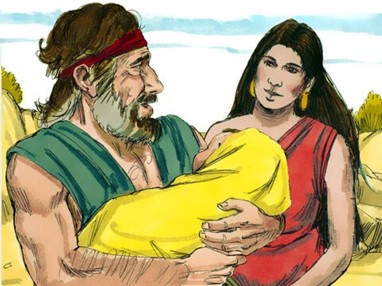
Then she became pregnant a third time and gave birth to another son. He was named Levi, for she said, “Surely this time my husband will feel affection for me since I have given him three sons!”
Even three sons could not change Jacob. Jacob still loved Rachel, not Leah. Leah was so disappointed. She found that nothing could change Jacob’s heart. Leah realized that she could not grab her husband’s love, which made her truly sad. But God, indeed, gave the unfathomable blessing to Leah, which Leah did not know at that time. Levi and Levi’s descendants became the priests of the entire descendants of Abraham, Isaac, and Jacob.
Leah still suffered because she was not loved and cried out to God. Once again God heard Leah. Leah became pregnant and gave birth to another son. She named him Judah, for she said,
“Now I will praise the LORD!” (Genesis 29:35b)
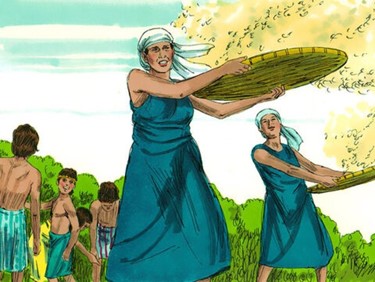
Leah finally realized that God blessed her, although her husband did not give her his love. Leah, then, praised God for His greatness, mercy, and love given to her. As a result, Leah got Reuben, Simeon, Levi, and Judah. Indeed, Jesus Christ officially came as a descendent of Judah! What a blessing it was! God blessed Leah, who became the mother of two most important tribes – Levi, who became the priests for all Israelites, and Judah, of whom Jesus came as a descendent.
On earth, there are many people like Leah. Indeed, Leah didn’t do anything wrong, but she was mistreated. Her husband had never loved Leah. Her husband, Jacob, only loved Rachel. However, God loved Leah. God saw Leah’s suffering and blessed her with the blessing that nobody could fathom. Leah cried out to God, and God answered. Then Leah realized she received God’s blessing — four sons. God, who was truly compassionate, showed His mercy, and at last, Leah praised God. Most of all, the blessings were far beyond the comprehension of Leah at that time. Leah did not know her two sons would become the center of the salvation of the Israelites and the rest of the world as being the conduit of God’s covenant given to Abraham, Isaac, and now Jacob.
The secret between God and us is this: we cry out God, and God answers. God’s answer with unfathomable blessings. How could Leah fathom the true blessings coming from her sons at that time? No way! But Leah praised God because she got four sons, but her sons were not ordinary sons. Yes, we should cry out to God, but God answers to us blessings far beyond our comprehension as God answered to Leah. Indeed, God uses our cry to fulfill His merciful plan for us and the rest of the world. Give thanks to God for His unfathomable mercy and love!

But you remain the same,
and your years will never end.
The children of your servants will live in your presence;
their descendants will be established before you.” (Psalm 102:27-28)
Have you never heard? Have you never understood? The LORD is the everlasting God, the Creator of all the earth. He never grows weak or weary. No one can measure the depths of his understanding. (Isaiah 40:28)
